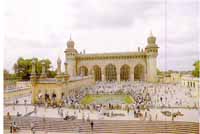At least seven killed in bombing at mosque in southern India
A bomb ripped through a historic mosque as Friday prayers were ending in southern India, killing at least seven people and wounding nearly three dozen, officials said. Two other unexploded bombs were found and defused by police.

Minutes after the blast at Hyderabad's 17th-century Mecca Masjid, Muslims angered by what they said was a lack of police protection began chanting slogans - a situation that quickly deteriorated as mobs threw stones at police, who dispersed them with baton charges and tear gas.
The bombing and ensuing clash between worshippers and police raised fears of wider Hindu-Muslim violence in the city, which has long been plagued by communal tensions - and occasional spasms of religious bloodletting.
Many of the 35 people injured in the explosion at the 17th-century Mecca Masjid were severely wounded, and the city's police chief, Balwinder Singh, warned the death toll could rise beyond the seven already dead.
Soon after the blast, Y.S. Rajasekhara Reddy, the chief minister of Andhra Pradesh state, where Hyderabad is located, appealed for calm between Hindus and Muslims.
Reddy called the bombing an act of "intentional sabotage on the peace and tranquility in the country."
He told reporters in New Delhi, where he was meeting with federal officials on unrelated business, that one bomb went off around 1:30 p.m. (0800 GMT) and that police soon after found and defused two other bombs.
The bomb, made of a stick-grenade packed into a metal pipe, was detonated by a mobile phone attached to the device, said the state's police chief, Mohammed Abdul Basit.
About 10,000 people usually attend Friday prayers at the mosque, which is located in a Muslim neighborhood of Hyderabad, and the blast sparked a panic.
"I was very close to the spot of the blast," said Abdul Quader, a 30-year-old who sustained light injuries to his legs.
"As soon as prayers ended, we were about to get up, there was a huge deafening blast sending bodies into the air," he continued. "People started running helter-skelter, there was such confusion. People were bleeding, running around in a very bad condition."
The NDTV news channel showed video pictures from within the mosque as the blast went off. A loud noise is heard, followed by pieces of masonry flying through the air.
Worshippers in white robes and skullcaps, many bent in prayer, initially appeared bewildered by the explosion before rushing out of the historic site as startled pigeons fluttered about inside the stone and marble mosque.
Outside, there was chaos following the attack. Throngs of people gathered in the streets, some chanting angry slogans and throwing rocks at police, who fired tear gas and tried to disperse the crowd with batons so ambulances could ferry the wounded to hospitals.
The explosion immediately drew comparisons to a Sept. 8 bombing of a mosque during a Muslim festival in Malegaon, a city in western India.
That attack killed 31 people and was seen as an attempt to inflame tensions between India's Hindu majority and Muslim minority. There are an estimated 130 million Muslims in India, a country of 1.1 billion people.
India's worst religious violence in recent years was in 2002, in the western Gujarat state. More than 1,000 people, most of them Muslim, were killed by Hindu mobs in revenge attacks after a train fire killed 60 Hindus returning from a religious pilgrimage. Muslims were blamed for the train fire.
A series of terrorist bombings have hit India in the past year, including the July bombings of seven Mumbai commuter trains that killed more than 200 people. Most of the bombings have been blamed on Muslim militants based in neighboring Pakistan, India's longtime rival.
The Hyderabad bombing comes the same day a judge in Mumbai began sentencing those convicted of involvement in India's worst terror attack, the 1993 Mumbai serial bombings that killed 257 people.
The bombs were believed to have been acts of revenge by Muslims for the demolition of a 16th century mosque by Hindu nationalists in northern India in 1992. After the demolition, religious riots erupted in India, leaving more than 800 dead, most of them Muslims.
Subscribe to Pravda.Ru Telegram channel, Facebook, RSS!


